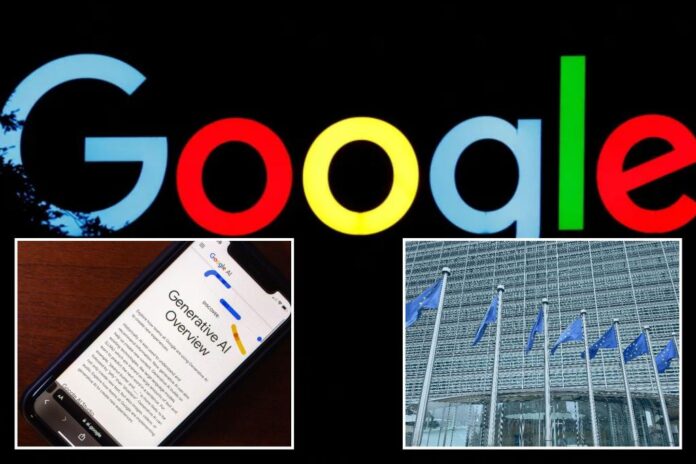Google’s controversial AI-generated summaries — which have been blamed for crushing the traffic of US news sites — have drawn an antitrust complaint in the European Union from a group of independent publishers.
The complaint by the Independent Publishers Alliance accuses the Sundar Pichai-led Big Tech giant of abusing its dominant position in online search by promoting its own AI-generated summaries over links to original content.
The filing, submitted on June 30, requests that the European Commission impose interim measures to prevent what it describes as “irreparable harm” to publishers.
“Google’s core search engine service is misusing web content for Google’s AI Overviews in Google Search, which have caused, and continue to cause, significant harm to publishers, including news publishers in the form of traffic, readership and revenue loss,” the complaint alleges.
The complaint comes as damning data revealed that AI Overviews have resulted in 37 of the top 50 US news domains suffering year-over-year traffic declines since its launch in May 2024, according to digital intelligence firm SimilarWeb.
A report by SimilarWeb also found that the AI summaries have led to a significant increase in the frequency of “zero clicks” to search queries.
The percentage of web searches related to news that end without a click to a news site jumped to 69% in May 2025 from 56% for the same month last year, SimilarWeb found.
A spokesperson for the Competition and Markets Authority, the EU’s antitrust agency, confirmed to The Post that it received the complaint.
“Last week, we proposed to designate Google with strategic market status in search and search advertising. If designated, this would allow us to introduce targeted measured to address specific aspects of how Google operates search services in the UK,” the rep told The Post on Friday.
AI Overviews are summaries generated using Google’s artificial intelligence models and are displayed at the top of general search results. The feature is available in more than 100 countries. Google began incorporating advertisements into AI Overviews this past May.
The publishers allege that Google’s practice of displaying its own summaries above hyperlinks disadvantages original content and is made worse by the lack of control publishers have over how their material is used.
“Publishers using Google Search do not have the option to opt out from their material being ingested for Google’s AI large language model training and/or from being crawled for summaries, without losing their ability to appear in Google’s general search results page,” the complaint alleges.
The Movement for an Open Web, whose members include digital advertisers and publishers, and British nonprofit Foxglove Legal Community Interest Company are also signatories to the complaint.
“In short, AI Overviews are theft from the publishing industry,” Tim Cowen, co-founder of Movement for an Open Web, told The Post.
“They steal publishers’ content and then use that to steal their traffic before it reaches their site. That’s unfair and a clear breach of copyright principles.”
Cowen added that he wants publishers “to have the ability to opt out of their content being harvested for AI Overviews without fear of being punished in search results.”
“In the longer term we want to see a fair economic and regulatory model that rewards publishers for the value of their works,” he said.
The three organizations are seeking regulatory intervention to address what they say is an urgent threat to competition and access to news.
Foxglove co-executive director Rosa Curling said the consequences of AI Overviews for news publishers are severe.
“Independent news faces an existential threat: Google’s AI Overviews,” Foxglove co-executive director Rosa Curling said.
“That’s why with this complaint, Foxglove and our partners are urging the European Commission, along with other regulators around the world, to take a stand and allow independent journalism to opt out.”
A Google spokesperson defended the AI Overviews feature and disputed the characterization of its impact on publishers.
“New AI experiences in Search enable people to ask even more questions, which creates new opportunities for content and businesses to be discovered,” the spokesperson told Reuters.
Google added that the company sends billions of clicks to websites each day and that traffic fluctuations can be influenced by many factors.
“The reality is that sites can gain and lose traffic for a variety of reasons, including seasonal demand, interests of users, and regular algorithmic updates to Search,” the spokesperson said.
The claims in the EU complaint echo a similar argument made in a lawsuit filed in the United States by an education technology company, which alleges that Google’s AI Overviews are eroding demand for original content and damaging the competitive ability of publishers, resulting in declines in both traffic and subscriptions.
Google has faced several antitrust investigations on both sides of the Atlantic Ocean in recent years.
The tech giant is appealing a $4.7 billion fine imposed by the European Commission for allegedly abusing its dominance with the Android operating system. Last month, an advisor to the EU’s top court recommended the fine be upheld.
The European Commission is also continuing investigations into Google’s conduct in digital advertising and search, with potential for further regulatory action.
In the United States, a federal judge ruled in August 2024 that Google violated antitrust law by maintaining monopolies in general search and search advertising, citing exclusive deals such as those with Apple.
A verdict after a trial on the remedy phase — which could include breaking up Google — is expected next month.
In a separate ruling in April 2025, another judge found Google had illegally monopolized online advertising markets by controlling both the buy and sell sides of the ad exchange.
With Post Wires








